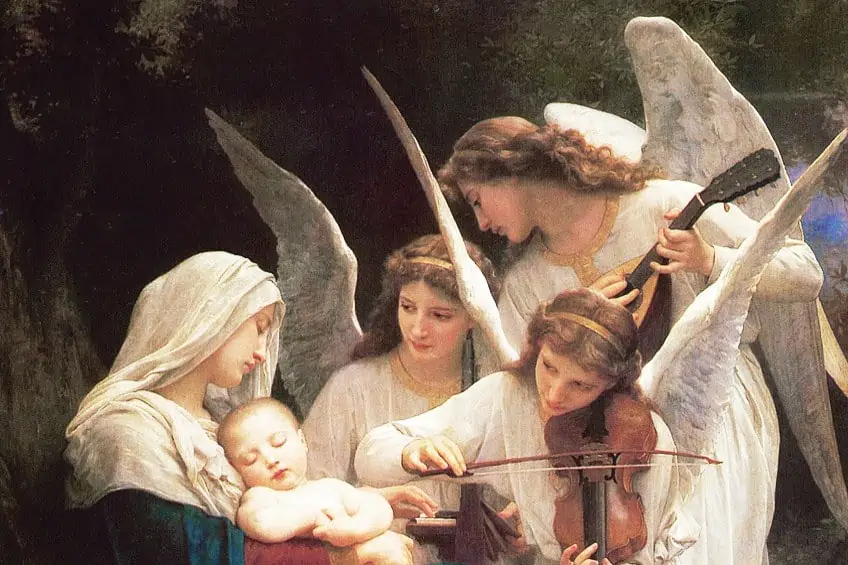Famous Angel Paintings – Explore Classic Famous Angel Paintings
Angels have been depicted in some of history’s finest paintings. Several of the most well-known painters of the Italian Renaissance frequently produced Renaissance paintings of angels. Since then, famous angel paintings have had a great appeal for both painters and art enthusiasts. Today we will discover several of these classic famous angel paintings.
The Most Significant Classic Famous Angel Paintings
Raphael, Michelangelo, and other artists created works that were based on some of the most well-known stories from the Judeo-Christian Bible and featured angels in some of the paintings. While many painters have sought to strictly adhere to the short descriptions we receive in the Bible and other ancient sources that explain the look of angels, others have endeavored to depict their version of these celestial beings in their Renaissance paintings of angels.
Artworks with angels are among the most famous pieces in human history, irrespective of the artist’s intentions or purpose.
The Annunciation (1450) by Petrus Christus
| Artist | Petrus Christus (1410 – 1475) |
| Date Completed | 1450 |
| Medium | Oil on wood |
| Current Location | Metropolitan Museum of Art, New York City, United States |
The Annunciation, a painting by Petrus Christus, is considered to be one of the most classic famous angel paintings. In this painting from 1450, the artist shows the Virgin Mary greeting the Angel Gabriel at a door of the church.
The title and Petrus Christus’ artwork suggest that this was the time when the angel informed the virgin that she would conceive and give birth to the Savior.
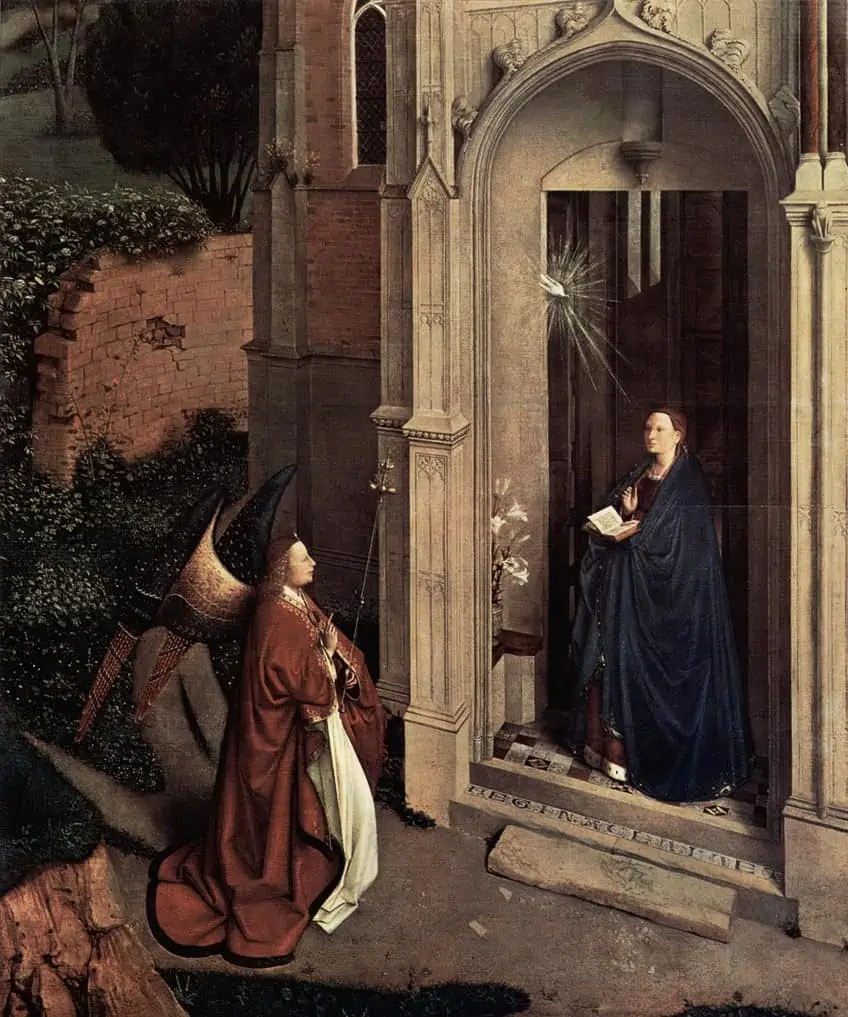
The unusual artwork depicts this scenario from a birds-eye perspective, presumably implying that the spectator is witnessing the scene from the perspective of either the Almighty or Christ. The artwork is renowned for the artist’s meticulous attention to every last detail, even the background plants.
Saint Michael Triumphs over the Devil (1468) by Bartolomé Bermejo
| Artist | Bartolomé Bermejo (1440 – 1498) |
| Date Completed | 1468 |
| Medium | Oil on wood |
| Current Location | National Gallery, London, United Kingdom |
Few of Bermejo’s paintings are known to still exist today, despite him being one of the most significant artists in Spain in the 15th century. This magnificent artwork is now on display at the National Gallery of Art in London after recently being repaired.
Archangel Michael is dressed in a golden, gleaming suit of battle armor that is embellished with lovely diamonds.
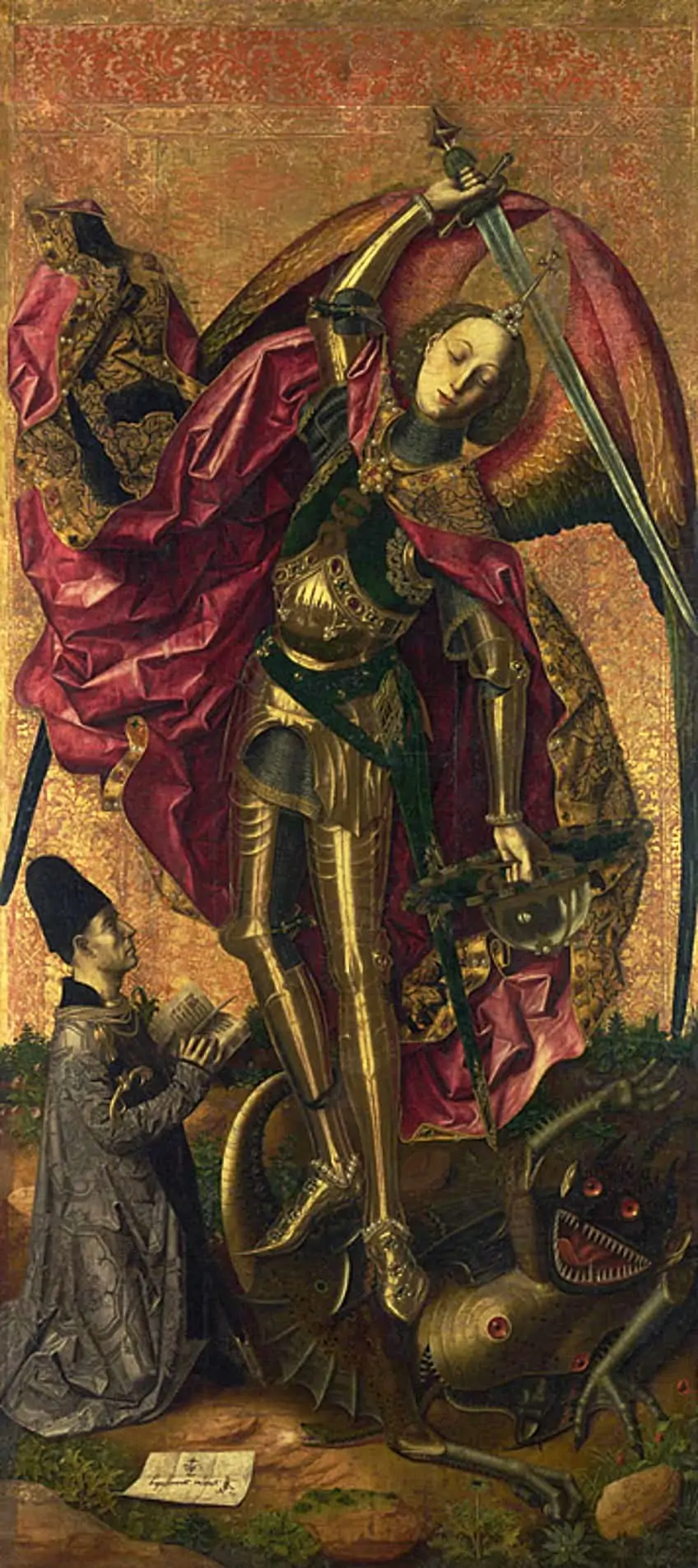
The influence of the Dutch artist Jan van Eyck is evident in the accurately rendered fabric textures, precious stones, amazing details, angel size, and vibrant wings. St. Michael leaps into action to thwart the Devil, as portrayed by Bermejo. To provide movement, a diagonal line of colorful, floating cloth that is realistically painted features in the image.
Female traits such as a softer jawline, large, red lips, and thin, rounded eyebrows are present in the calm, stylized face.
The Sistine Madonna (1512) by Raphael
| Artist | Raffaello “Raphael” Sanzio da Urbino (1483 – 1520) |
| Date Completed | 1512 |
| Medium | Oil on canvas |
| Current Location | Gemäldegalerie Alte Meister, Dresden, Germany |
Most art historians rank Raphael as one of the greatest artists in history and speculate that he was second only to Leonardo da Vinci in terms of fame. This piece of art, which depicts a Madonna – a portrayal of the Mother Mary – along with other Scriptural figures, is one of the more recognizable artworks that concentrate on angels and divine beings.
After receiving a commission from Pope Julius II, the artwork was completed in 1512.
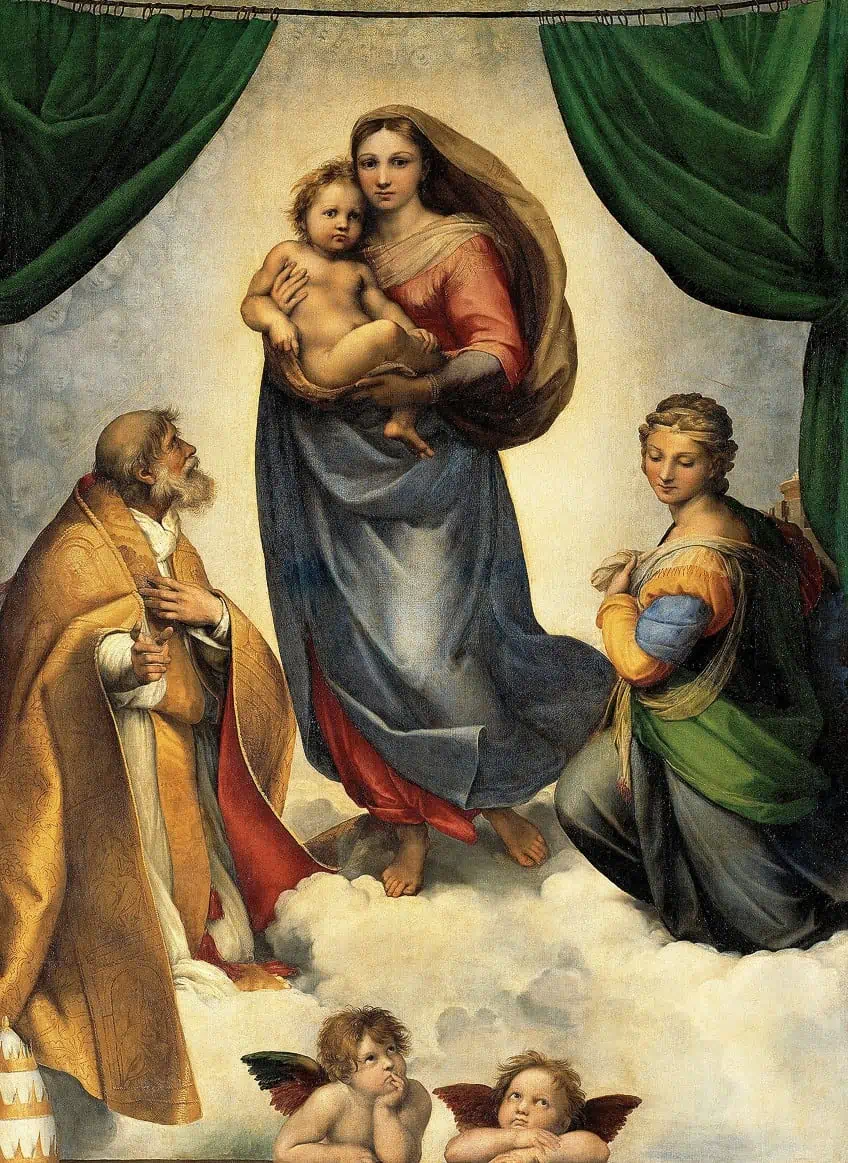
It shows the Virgin Mary walking on a cloud while holding the infant Jesus in her arms. Saint Barbara and Saint Sixtus are positioned next to her, but the two individuals who are maybe most well-known are the innocent cherubs.
These celestial angels are shown as being very pure and looking up at Mary and the infant Jesus with a somewhat bemused expression.
Conversion of Saul (1545) by Michelangelo
| Artist | Michelangelo di Lodovico Buonarroti Simoni (1475 – 1564) |
| Date Completed | 1545 |
| Medium | Fresco |
| Current Location | Cappella Paolina, Vatican Palace, Vatican City |
One of the most well-known New Testament tales is the one about the apostle Paul’s meeting with Jesus. On the way to Damascus, Christ showed himself to Saul, who would eventually become Paul and his fellow companions. Michelangelo attempted to recreate that moment.
The Vatican’s Pauline Chapel is where this piece was painted probably in or around 1545.
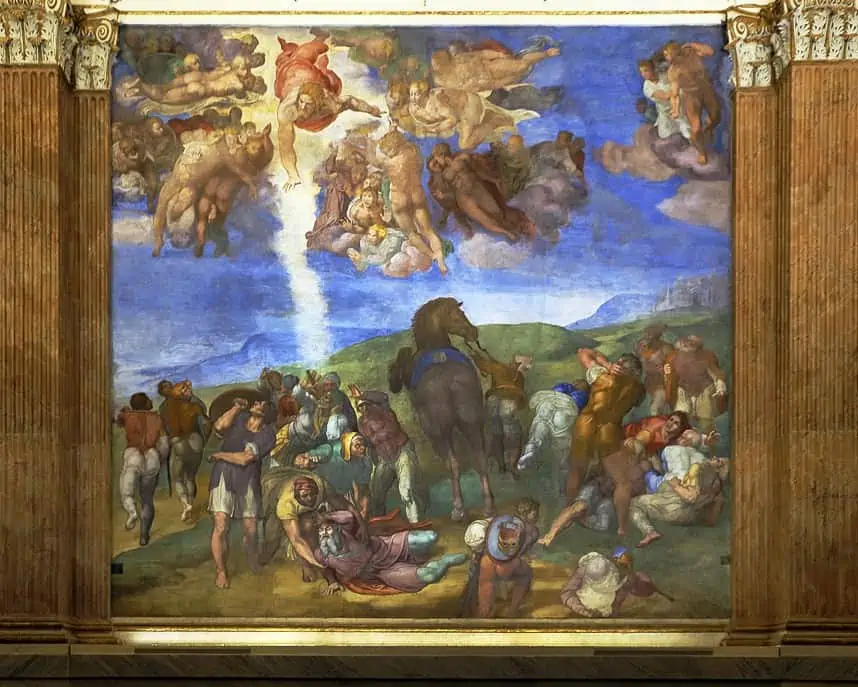
Since Michelangelo incorporated multiple images of the angels around Christ when he is seen floating above Paul, the picture includes many additional figures that are not included in the Biblical narrative of the event. The men who traveled with Saul in the artwork appear to be captivated by the bright illumination of Christ’s entrance, rendering the angels invisible to them.
Due to its representation of the event and the numerous individuals, Michelangelo included in the enormous mural, this work is regarded as among the most iconic religious artworks of the era.
St. Francis of Assisi in Ecstasy (1595) by Caravaggio
| Artist | Michelangelo Merisi da Caravaggio (1571 – 1610) |
| Date Completed | 1595 |
| Medium | Oil on canvas |
| Current Location | Wadsworth Atheneum, Hartford, United States |
When it comes to paintings with religious subjects, Michelangelo Merisi da Caravaggio was regarded as a true master. The strong contrast between dark and light in the artist’s images makes it easy to identify his works. Saint Francis of Assisi is seen in this artwork being held in the embrace of an angel at the same moment he underwent a phenomenon called Stigmata, in which he sustained scars on his feet and hands that were symbolic of Christ’s crucifixion.
It is believed that Caravaggio completed this piece while residing in Palazzo Madama and working as Del Monte’s artist.
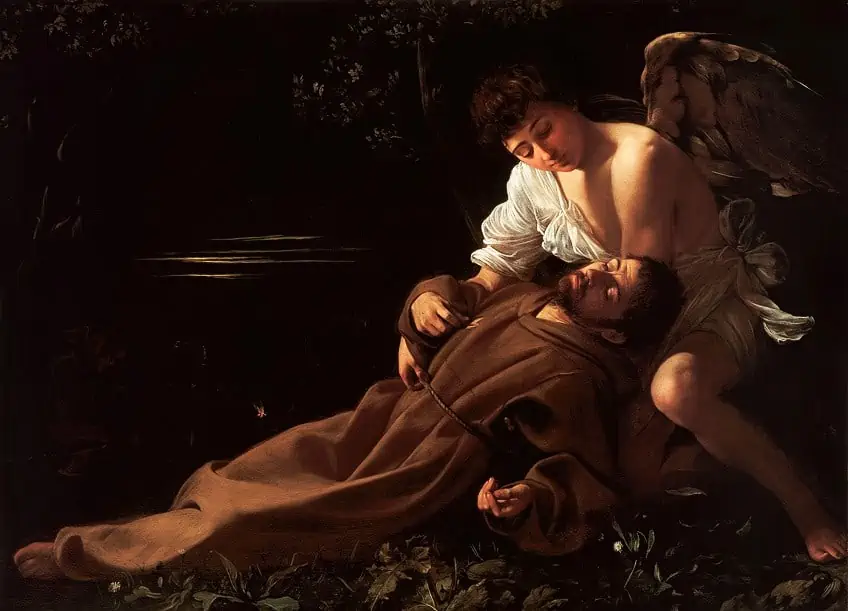
According to descriptions of angels in the Old Testament, the angel depicted in the artwork is a seraph with six wings. Brother Leo recounted the event and noted that Saint Francis had what looked to be a moment of unfathomable bliss.
The Triumph of Victory (1614) by Peter Paul Rubens
| Artist | Peter Paul Rubens (1577 – 1640) |
| Date Completed | 1614 |
| Medium | Oil on wood |
| Current Location | Gemäldegalerie Alte Meister, Kassel, Germany |
Peter Paul Rubens produced one of the most well-known angel artworks of the 17th century in 1614. The picture is an iconic representation of an allegorical event in which good triumphs over evil. The Christian character, who is positioned above his enemies, is accompanied by a heavenly being on either flank.
According to numerous art experts and historians, the artwork has a wide range of metaphorical connotations.
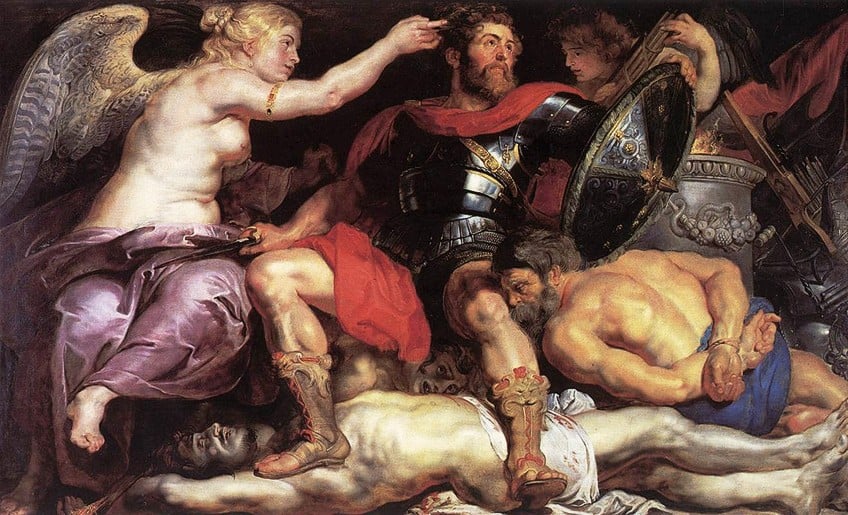
As a biblical representation of how Jesus is claimed to imprison Satan and bad spirits, the conqueror is pictured sitting on the lifeless bodies of people who seem to be tied. The triumphant warrior is depicted having an oak leaf crown placed on his head by a winged angel.
Jacob Wrestling with the Angel (1659) by Rembrandt
| Artist | Rembrandt van Rijn (1606 – 1669) |
| Date Completed | 1659 |
| Medium | Oil on canvas |
| Current Location | Gemäldegalerie, Berlin, Germany |
Jacob’s Biblical encounter with a divine angel has been dramatized several times over the centuries. This painting by Dutch artist Rembrandt Van Rijn is one of the most well-known depictions of the theme. Rembrandt painted this piece in 1659.
It has remained among his most well-known works of art.
Jacob Wrestling with the Angel (1659) by Rembrandt, located in the Gemäldegalerie in Berlin, Germany; Rembrandt, Public domain, via Wikimedia Commons
Rembrandt appears to recognize the angel’s supernatural strength by portraying the angel with a tranquil look as Jacob struggles mightily in place of showing the angel engaged in close combat with the mortal Jacob. The angel appears to be gently cradling Jacob so as not to hurt him, much like one might carry a newborn.
The Annunciation of the Lord (1660) by Bartolomé Esteban Murillo
| Artist | Bartolomé Esteban Murillo (1617 – 1682) |
| Date Completed | 1660 |
| Medium | Oil on canvas |
| Current Location | Museo del Prado, Madrid, Spain |
The Annunciation of the Lord, a painting by Bartolomé Esteban Murillo, is one of the most well-known works that contains several angelic creatures. The Virgin Mary is depicted hovering above the angelic beings figures in Murillo’s 1660 painting as she is informed by the Archangel Gabriel that she would carry and produce a child who was going to be the Messiah of Humanity.
These angels are shown as helpless creatures who perfectly capture the purity that Christians of this period believed angels to possess.
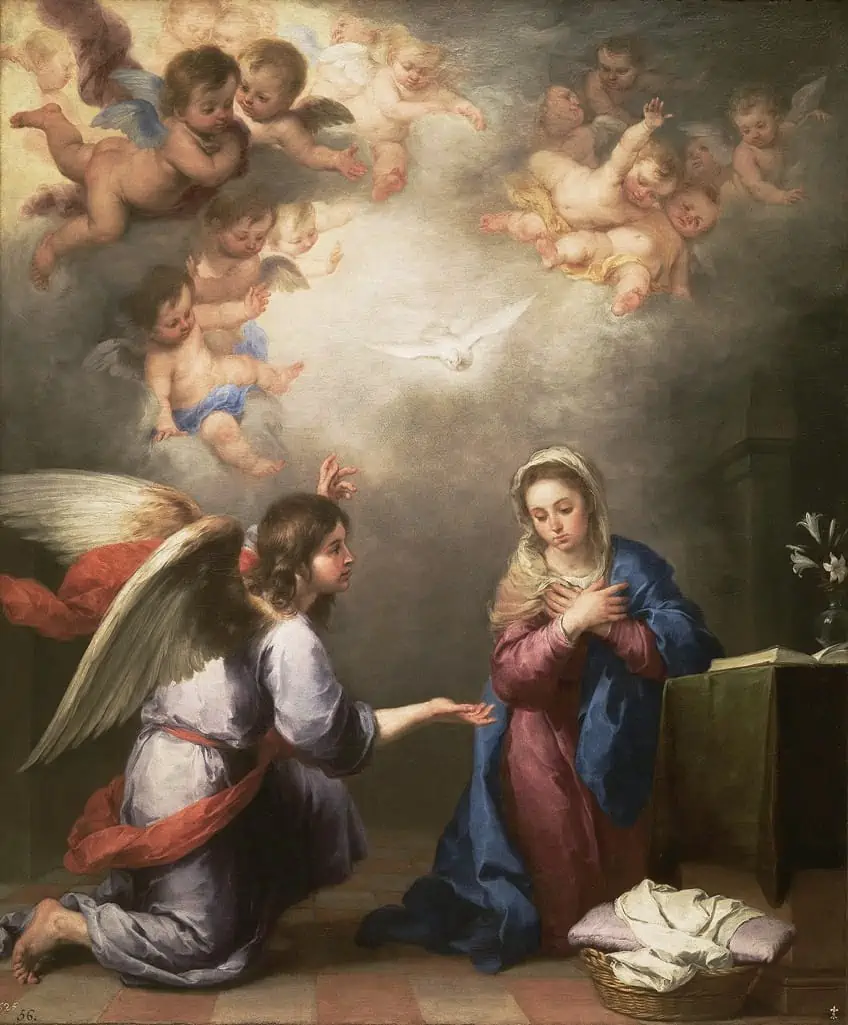
A white dove flying toward Mary is depicted in the center of the image. The fact that Bartolomé Esteban Murillo chose to depict the angels in this artwork in such a childlike way has led to it being hailed as one of the most famous angel paintings.
The Angel Standing in the Sun (1846) by Joseph William Turner
| Artist | Joseph Mallord William Turner (1789 – 1862) |
| Date Completed | 1846 |
| Medium | Oil on canvas |
| Current Location | Tate Museum, London, United Kingdom |
While Turner is often known for his depictions of landscapes and the sea, he did sometimes explore more religious subjects, notably in the 1830s. The viewer can observe a heavenly creature poised in the sun bearing a sword as if preparing to inflict revenge on mankind, which is unlike most of the other paintings on our list.
The sight is reminiscent of the biblical belief that one day God would chastise the world by consuming it in the fire.
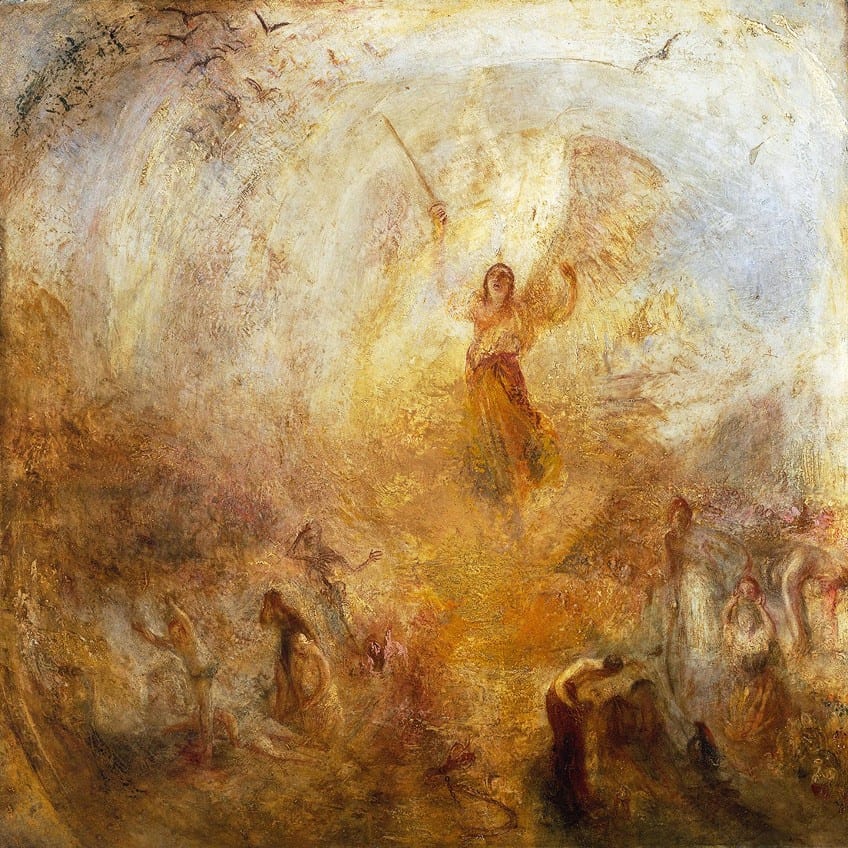
At the bottom left and right of the painting, other indistinct people can be observed. The scene to the left of the viewers depicts Adam and Eve weeping over the murder of their son Abel by Cain. To prevent the slaughter of her people, the character of Judith is shown on the right killing the Assyrian commander Holofernes.
The phrase “the banquet of vultures after the day is over” were painted on the canvas by Turner.
A Soul Brought to Heaven (1878) by William-Adolphe Bouguereau
| Artist | William-Adolphe Bouguereau (1825 – 1905) |
| Date Completed | 1878 |
| Medium | Oil on canvas |
| Current Location | Musée d’art et d’archéologie du Périgord, Perigueux, France |
Bouguereau was well-known for his lifelike depictions of the human figure in his late-19th-century paintings. Few of his works, though, received as much attention as this one, which he made in 1878. While Bouguereau’s name is not frequently included among the finest artists of his day, he received high acclaim from artists such as Claude Monet and Edgar Degas. This artwork is one of the most famous angel paintings since it depicts two celestial beings soaring toward a faraway light that one can only imagine is heaven.
The angels carrying the woman appear to be oblivious that they are doing so; they are both gazing at the winged shape in the distance.
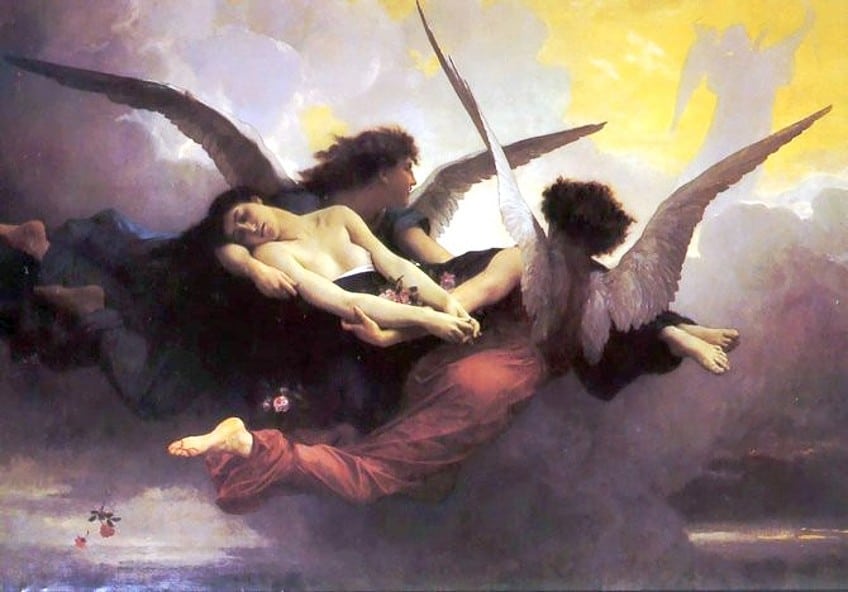
Song of the Angels (1881) by William-Adolphe Bouguereau
| Artist | William-Adolphe Bouguereau (1825 – 1905) |
| Date Completed | 1881 |
| Medium | Oil on canvas |
| Current Location | Forest Lawn Museum, California, United States |
Song of the Angels is yet another well-known work by French artist Bouguereau. This artwork, which was created in 1881, is one of Bouguereau’s most well-known angel-themed pieces. With its representations of angels and what is believed to be the Virgin Mary carrying a sleeping infant Jesus, it has a more classical style that appears to mimic Renaissance art. While most painters choose to depict Jesus as an adult, there are still those who choose to show him as a child.
The Virgin Mary appears to be ignorant of the arrival of the heavenly beings as they conclude their song, and every aspect of the artwork has been executed with meticulous attention to detail.
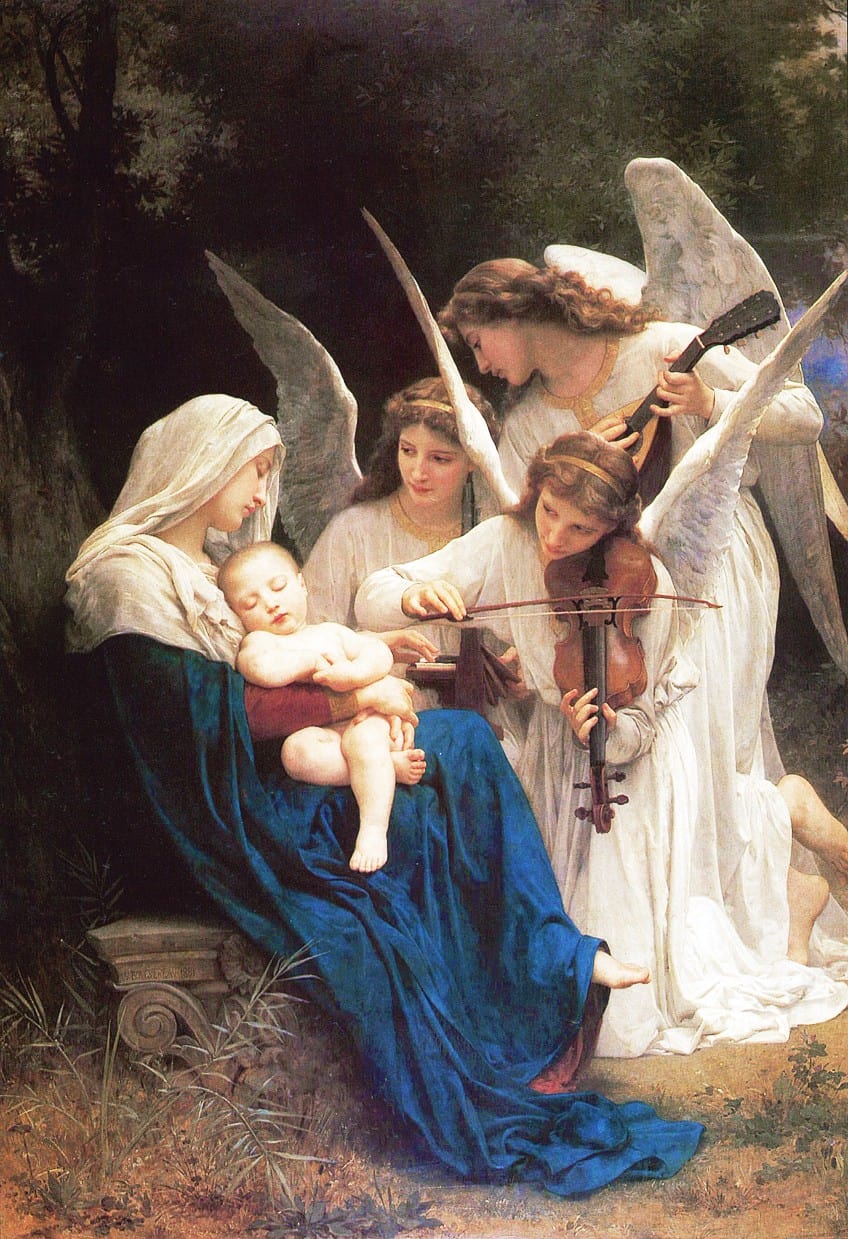
From the Renaissance paintings of angels to the 19th-century depictions of holy beings, angels have been featured in artworks for many centuries. Perhaps it is the appearance of the ethereal beings, or maybe because Christianity was so prominent in the daily lives of the people of the past. Whatever the reason, we are glad that artists created these classic famous angel paintings for us to admire and enjoy.
Take a look at our angel paintings webstory here!
Frequently Asked Questions
What Are Angels?
Angels are heavenly beings from the Christian bible. They are a big part of Christian belief, so it is no wonder they feature so prominently in many artworks. However, there is no one way to depict them and every artist has created their version of them.
Why Did Artists Include Angels in Their Artworks?
Artists love to include elements in their works that have symbolic meaning. Angles can represent something holy and pure. Perhaps that is why we have so many classic famous angel paintings in existence still today.
Jordan Anthony is a Cape Town-based film photographer, curator, and arts writer. She holds a Bachelor of Art in Fine Arts from the University of the Witwatersrand, Johannesburg, where she explored themes like healing, identity, dreams, and intuitive creation in her Contemporary art practice. Jordan has collaborated with various local art institutions, including the KZNSA Gallery in Durban, the Turbine Art Fair, and the Wits Art Museum. Her photography focuses on abstract color manipulations, portraiture, candid shots, and urban landscapes. She’s intrigued by philosophy, memory, and esotericism, drawing inspiration from Surrealism, Fluxus, and ancient civilizations, as well as childhood influences and found objects. Jordan is working for artfilemagazine since 2022 and writes blog posts about art history and photography.
Learn more about Jordan Anthony and about us.
Cite this Article
Jordan, Anthony, “Famous Angel Paintings – Explore Classic Famous Angel Paintings.” artfilemagazine – Your Online Art Source. November 1, 2022. URL: https://artfilemagazine.com/famous-angel-paintings/
Anthony, J. (2022, 1 November). Famous Angel Paintings – Explore Classic Famous Angel Paintings. artfilemagazine – Your Online Art Source. https://artfilemagazine.com/famous-angel-paintings/
Anthony, Jordan. “Famous Angel Paintings – Explore Classic Famous Angel Paintings.” artfilemagazine – Your Online Art Source, November 1, 2022. https://artfilemagazine.com/famous-angel-paintings/.


